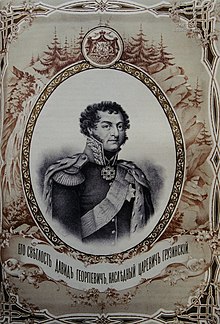This is the current revision of this page, as edited by Векочел (talk | contribs) at 19:39, 5 January 2025 (script-assisted date audit and style fixes per MOS:NUM). The present address (URL) is a permanent link to this version.
Revision as of 19:39, 5 January 2025 by Векочел (talk | contribs) (script-assisted date audit and style fixes per MOS:NUM)(diff) ← Previous revision | Latest revision (diff) | Newer revision → (diff) Heir apparent and regent of Georgia (1767–1819) This article is about Prince David Bagrationi of Georgia. For other uses, see Prince David of Kakheti and David Bagration of Mukhrani.You can help expand this article with text translated from the corresponding article in Russian. (July 2011) Click for important translation instructions.
|
| Prince David of Georgia | |
|---|---|
 | |
| Regent of Georgia | |
| Reign | 28 December 1800 – 18 January 1801 |
| Head of the Royal House of Georgia | |
| Reign | 28 December 1800 – 13 May 1819 |
| Predecessor | George XII of Georgia |
| Successor | Ioane Bagrationi |
| Born | (1767-07-01)1 July 1767 Tbilisi, Kingdom of Kartli-Kakheti |
| Died | 13 May 1819(1819-05-13) (aged 51) St Petersburg, Russian Empire |
| Burial | Feodorovskaya Church, Alexander Nevsky Monastery |
| Spouse | Elene Abamelik |
| House | Bagrationi |
| Father | George XII of Georgia |
| Mother | Ketevan Andronikashvili |
| Religion | Georgian Orthodox Church |
| Khelrtva |  |
David Bagrationi (Georgian: დავით ბაგრატიონი, Davit Bagrationi), also known as David the Regent (Georgian: დავით გამგებელი, Davit Gamgebeli) (1 July 1767 – 13 May 1819), was a Georgian royal prince (batonishvili), writer, scholar, and regent of the Kingdom of Kartl-Kakheti from 28 December 1800 to 18 January 1801.
The eldest son of the last Kartli-Kakhetian, King George XII by his first wife Ketevan Andronikashvili, he was educated in Russia (1787–1789), and served there as a colonel of the Russian army from 1797 to 1798. He was proclaimed as Heir Apparent by his father on 22 February 1799 and confirmed by the Russian Tsar Paul I, an official protector of Georgia, on 18 April 1799. In 1800, he attempted to modernize the law and administration. He became a lieutenant general the same year.
On his father's death in December 1800, David became the head of the Royal House of Bagrationi but was not allowed to ascend the throne of Kartli-Kakheti. David ruled briefly between the time of his father's death (28 December 1800) and the arrival of General Knorring (24 May 1801). In November 1800 the Russian Tsar had prohibited him from doing that without Russian consent. On 18 January 1801 he was surprised by a decree of Paul I declaring the annexation of the Kingdom to the Russian Empire. He tried to remain in power as de facto head of state. In May 1801 Russian General Carl Heinrich Knorring removed him from power and established a provisional government headed by General Ivan Petrovich Lasarev. Prince David was brought to St Petersburg under a military escort on 18 February 1803. From 1812 to 1819, he held a seat in the Senate of the Russian Empire.
He married in 1800 Princess Elene Abamelik (1770—1836), and died childless in 1819. He was buried at the Alexander Nevsky Monastery.
Influenced by the ideas of French Enlightenment, he was the first Georgian translator of Voltaire. He was also an author of a research on Georgian history (Georgian, 1814), Review of the Georgian Law (Russian, 1811—1816), Abridged Manual of Physics (Georgian, 1818), and several poems.
Ancestry
| Ancestors of Prince David of Georgia | |||||||||||||||||||||||||||||||||||||||||||||||||||||||||||||||||||||||||||||||||||||||||||||||||||||||||||||||||||||||||||||||||||||||||||||||||||||||||||||||||||||||||||||||||||||||||||||||||||||||||||||||||||||||||||||||||||||||||||||||||||||||||||||||||||||||||||||||||||||||||||||||||||||||||||||||||||||||||||||||||||||||||||||||||||||||||||||||||||||||||||||||||||||||||||||||||||||||||||||||||||||||||||||||||||||||||||||||||||||||||||||||||||||||||||||||||||
|---|---|---|---|---|---|---|---|---|---|---|---|---|---|---|---|---|---|---|---|---|---|---|---|---|---|---|---|---|---|---|---|---|---|---|---|---|---|---|---|---|---|---|---|---|---|---|---|---|---|---|---|---|---|---|---|---|---|---|---|---|---|---|---|---|---|---|---|---|---|---|---|---|---|---|---|---|---|---|---|---|---|---|---|---|---|---|---|---|---|---|---|---|---|---|---|---|---|---|---|---|---|---|---|---|---|---|---|---|---|---|---|---|---|---|---|---|---|---|---|---|---|---|---|---|---|---|---|---|---|---|---|---|---|---|---|---|---|---|---|---|---|---|---|---|---|---|---|---|---|---|---|---|---|---|---|---|---|---|---|---|---|---|---|---|---|---|---|---|---|---|---|---|---|---|---|---|---|---|---|---|---|---|---|---|---|---|---|---|---|---|---|---|---|---|---|---|---|---|---|---|---|---|---|---|---|---|---|---|---|---|---|---|---|---|---|---|---|---|---|---|---|---|---|---|---|---|---|---|---|---|---|---|---|---|---|---|---|---|---|---|---|---|---|---|---|---|---|---|---|---|---|---|---|---|---|---|---|---|---|---|---|---|---|---|---|---|---|---|---|---|---|---|---|---|---|---|---|---|---|---|---|---|---|---|---|---|---|---|---|---|---|---|---|---|---|---|---|---|---|---|---|---|---|---|---|---|---|---|---|---|---|---|---|---|---|---|---|---|---|---|---|---|---|---|---|---|---|---|---|---|---|---|---|---|---|---|---|---|---|---|---|---|---|---|---|---|---|---|---|---|---|---|---|---|---|---|---|---|---|---|---|---|---|---|---|---|---|---|---|---|---|---|---|---|---|---|---|---|---|---|---|---|---|---|---|---|---|---|---|---|---|---|---|---|---|---|---|---|---|---|---|---|---|---|---|---|---|---|---|---|---|---|---|---|---|---|---|---|---|---|---|---|---|---|---|---|---|---|---|---|---|---|---|---|---|---|---|---|---|---|---|---|---|---|---|---|---|---|---|---|---|---|---|---|---|---|---|---|---|---|---|---|---|---|---|---|---|
| |||||||||||||||||||||||||||||||||||||||||||||||||||||||||||||||||||||||||||||||||||||||||||||||||||||||||||||||||||||||||||||||||||||||||||||||||||||||||||||||||||||||||||||||||||||||||||||||||||||||||||||||||||||||||||||||||||||||||||||||||||||||||||||||||||||||||||||||||||||||||||||||||||||||||||||||||||||||||||||||||||||||||||||||||||||||||||||||||||||||||||||||||||||||||||||||||||||||||||||||||||||||||||||||||||||||||||||||||||||||||||||||||||||||||||||||||||
References
- Suny, Ronald Grigor (1994), The Making of the Georgian Nation: 2nd edition, p. 357. Indiana University Press, ISBN 0-253-20915-3
Literature
- Takaishvili, E. Chronological list written by Davit Batonishvili, son of King Giorgi. Historical materials. Book two . Vol., 1912, p. 54-55;
- Georgian Soviet Encyclopedia, Vol. 3, ch., 1978. — p. 338.
- Sikharulidze F., Potskhishvili A., Encyclopedia "Georgia", vol. 2, ch., 2012. — p. 279.
| Age of Enlightenment | |||||||||||||||||||||||||||||||||||||
|---|---|---|---|---|---|---|---|---|---|---|---|---|---|---|---|---|---|---|---|---|---|---|---|---|---|---|---|---|---|---|---|---|---|---|---|---|---|
| |||||||||||||||||||||||||||||||||||||
| Romanticism → | |||||||||||||||||||||||||||||||||||||
| Triarchy in Georgia (1463–1810) | |||||||||
|---|---|---|---|---|---|---|---|---|---|
| |||||||||
- Politicians from Tbilisi
- Male writers from Georgia (country)
- 19th-century historians from Georgia (country)
- Bagrationi dynasty of the Kingdom of Kartli-Kakheti
- Georgian princes
- 1767 births
- 1819 deaths
- Writers from Tbilisi
- Regents of Georgia
- Imperial Russian Army generals
- Georgian generals in the Imperial Russian Army
- Georgian lieutenant generals (Imperial Russia)
- 18th-century regents
- 19th-century regents
- 18th-century historians from Georgia (country)
- Heirs apparent who never acceded
- Burials at the Feodorovskaya Church of the Alexander Nevsky Lavra